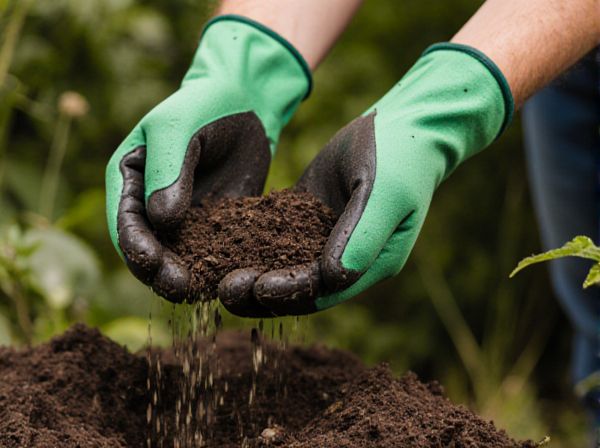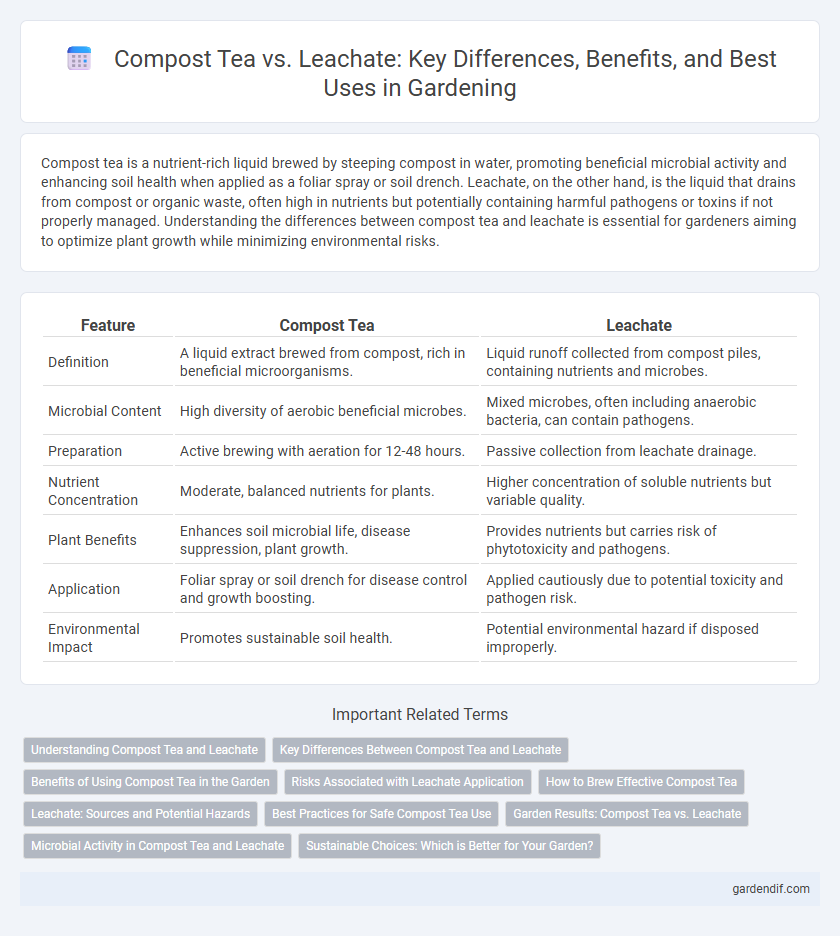
Compost tea vs Leachate Illustration
Compost tea is a nutrient-rich liquid brewed by steeping compost in water, promoting beneficial microbial activity and enhancing soil health when applied as a foliar spray or soil drench. Leachate, on the other hand, is the liquid that drains from compost or organic waste, often high in nutrients but potentially containing harmful pathogens or toxins if not properly managed. Understanding the differences between compost tea and leachate is essential for gardeners aiming to optimize plant growth while minimizing environmental risks.
Table of Comparison
| Feature | Compost Tea | Leachate |
|---|---|---|
| Definition | A liquid extract brewed from compost, rich in beneficial microorganisms. | Liquid runoff collected from compost piles, containing nutrients and microbes. |
| Microbial Content | High diversity of aerobic beneficial microbes. | Mixed microbes, often including anaerobic bacteria, can contain pathogens. |
| Preparation | Active brewing with aeration for 12-48 hours. | Passive collection from leachate drainage. |
| Nutrient Concentration | Moderate, balanced nutrients for plants. | Higher concentration of soluble nutrients but variable quality. |
| Plant Benefits | Enhances soil microbial life, disease suppression, plant growth. | Provides nutrients but carries risk of phytotoxicity and pathogens. |
| Application | Foliar spray or soil drench for disease control and growth boosting. | Applied cautiously due to potential toxicity and pathogen risk. |
| Environmental Impact | Promotes sustainable soil health. | Potential environmental hazard if disposed improperly. |
Understanding Compost Tea and Leachate
Compost tea is a nutrient-rich liquid brewed by steeping compost in water, promoting beneficial microbial growth that enhances soil health and plant growth. Leachate is the liquid that drains from compost piles, containing soluble nutrients and organic compounds but often requiring careful management to prevent environmental pollution. Understanding the distinct microbial profiles and nutrient concentrations in compost tea versus leachate is essential for effective use in sustainable agriculture and waste management.
Key Differences Between Compost Tea and Leachate
Compost tea is a liquid extract brewed from compost that contains beneficial microorganisms aimed at enhancing soil and plant health, while leachate is the liquid that drains from compost piles, often rich in nutrients but potentially containing harmful pathogens and pollutants. Compost tea is actively aerated and carefully managed to maximize microbial diversity and viability, whereas leachate occurs passively and varies in composition depending on compost conditions. The controlled production of compost tea allows for targeted application in agriculture and gardening, contrasting with leachate, which requires treatment or careful disposal due to its environmental risks.
Benefits of Using Compost Tea in the Garden
Compost tea enhances soil microbial activity by introducing beneficial bacteria and fungi that improve nutrient availability and plant health. It reduces the need for chemical fertilizers by naturally suppressing diseases and promoting stronger root systems. Using compost tea in the garden fosters a sustainable ecosystem that supports plant growth and soil vitality.
Risks Associated with Leachate Application
Leachate from compost contains high concentrations of pathogens, heavy metals, and organic pollutants, posing significant risks to soil and water quality. Unlike compost tea, leachate's uncontrolled composition increases the likelihood of environmental contamination and potential harm to crop health. Proper management and treatment of leachate are essential to minimize the spread of harmful microorganisms and toxic substances during its application.
How to Brew Effective Compost Tea
Brewing effective compost tea requires using high-quality, mature compost rich in beneficial microbes and nutrients, ensuring an active microbial population thrives during the brewing process. Maintaining optimal conditions such as aeration, temperature between 65-75degF, and adding liquid aeration to stimulate microbial growth enhances the tea's potency. Unlike leachate, which is often anaerobic and nutrient-heavy runoff, properly aerated compost tea delivers a balanced, microbially diverse solution that promotes plant health and soil vitality.
Leachate: Sources and Potential Hazards
Leachate originates from organic waste decomposition in compost piles, where moisture percolates through the material, extracting soluble nutrients and contaminants. This dark, nutrient-rich liquid can contain pathogens, heavy metals, and high levels of ammonia, posing environmental hazards if improperly managed. Leachate runoff into water bodies may cause pollution, eutrophication, and risks to aquatic ecosystems and human health.
Best Practices for Safe Compost Tea Use
Compost tea, a liquid extract brewed from compost, contains beneficial microorganisms that enhance plant growth and soil health, while leachate is the runoff produced from water percolating through compost piles and may harbor pathogens. To ensure safe compost tea use, always source compost from well-managed, pathogen-free materials, maintain aerobic brewing conditions to prevent harmful bacteria proliferation, and apply the tea promptly to minimize risks. Regular testing for microbial contaminants and avoiding application during wet weather further reduce potential plant and human health hazards.
Garden Results: Compost Tea vs. Leachate
Compost tea promotes nutrient availability and microbial diversity, enhancing plant growth and disease resistance in garden soils. Leachate, rich in soluble nutrients and organic matter, can improve soil fertility but carries a higher risk of pathogen contamination and nutrient runoff. Gardeners often observe healthier foliage and improved root development with compost tea applications compared to the more inconsistent benefits of leachate.
Microbial Activity in Compost Tea and Leachate
Compost tea exhibits higher microbial diversity and activity compared to leachate, promoting beneficial bacteria and fungi essential for soil health and plant growth. Leachate, a liquid by-product of compost, primarily contains soluble nutrients but often harbors fewer microbial populations due to its anaerobic and nutrient-depleted nature. Enhanced microbial activity in compost tea contributes to improved nutrient cycling, disease suppression, and overall soil ecosystem resilience.
Sustainable Choices: Which is Better for Your Garden?
Compost tea and leachate both offer organic nutrients that enhance soil health, but compost tea is generally favored for sustainable gardening due to its rich microbial diversity that promotes plant growth and disease resistance. Leachate, while nutrient-rich, can sometimes contain harmful pathogens or excess salts that may negatively impact soil balance if not properly managed. Choosing compost tea supports a healthier garden ecosystem by improving soil structure and boosting beneficial microorganisms, aligning with sustainable gardening practices.
Compost tea vs Leachate Infographic

 gardendif.com
gardendif.com